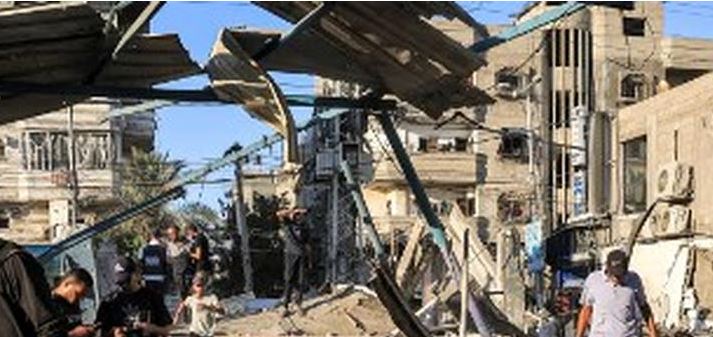On August 30, 2024, the northeastern Ukrainian city of Kharkiv was rocked by a devastating Russian bombing that left at least four people dead, including a child, and injured 28 others. The attack targeted a residential area and a playground, escalating the ongoing conflict and drawing widespread condemnation from both local authorities and international leaders.
Overview of the Attack
The assault involved a guided bomb strike that hit a 12-story apartment building and a nearby playground, causing catastrophic damage. Firefighters and emergency personnel arrived at the scene to combat the fires that had erupted in the residential building. Eyewitness accounts and footage from the site reveal intense flames and heavy black smoke billowing from the upper floors of the apartment block, illustrating the severe impact of the attack.
Ihor Terekhov, the mayor of Kharkiv, confirmed the tragic loss of a child who was playing on the playground when the bomb exploded. The attack also resulted in the death of three other individuals within the apartment building, further intensifying the city’s anguish and sorrow.
Continued Attacks on Kharkiv
Kharkiv, Ukraine’s second-largest city, has been a frequent target of Russian military operations throughout the ongoing conflict. The use of highly destructive guided bombs has been a recurrent strategy in the region, contributing to significant civilian casualties and infrastructural damage.
The relentless bombardment has left Kharkiv and its residents in a constant state of fear and uncertainty. Despite repeated international condemnation and calls for de-escalation, Russian attacks on civilian areas persist, exacerbating the humanitarian crisis in the region.
President Zelenskiy’s Response
In the wake of the attack, Ukrainian President Volodymyr Zelenskiy has renewed his call for increased support from Western allies. Zelenskiy emphasized the need for long-range strike capabilities to counteract the Russian military’s air superiority and prevent future attacks on Ukrainian cities.
“A strike on Kharkiv would not have occurred if our defense forces had the capability to destroy Russian military aircraft where they are based,” Zelenskiy stated in a Telegram message. The President’s appeal highlights the ongoing struggle of the Ukrainian military to defend against increasingly sophisticated and devastating Russian strikes.
Russia’s Denial and the Human Cost
The Russian government has consistently denied deliberately targeting civilians during its military operations. However, the civilian death toll and the widespread destruction resulting from these attacks contradict these claims. The August 30 bombing is yet another example of the severe human cost of the conflict, underscoring the urgent need for a comprehensive and sustained international response.
Despite the Russian government’s denials, the reality on the ground reflects a grim picture of the conflict’s impact on ordinary people. Thousands have been killed or injured as a result of Russian strikes over the past two and a half years, highlighting the extensive and ongoing nature of the humanitarian crisis in Ukraine.
International Reactions and the Path Forward
The international community continues to grapple with how best to address the crisis in Ukraine. Calls for increased military support for Ukraine and enhanced sanctions against Russia are growing louder, but significant challenges remain in coordinating a unified response. The devastating attack on Kharkiv further underscores the need for a decisive and effective strategy to support Ukraine in its struggle against Russian aggression.
As the conflict drags on, the situation in Kharkiv serves as a stark reminder of the personal and collective toll of the war. The city’s residents, alongside the broader Ukrainian population, face daily challenges and threats to their safety and well-being. The international community’s response will play a critical role in shaping the future of the conflict and determining the prospects for peace and stability in the region.
Conclusion
The bombing in Kharkiv on August 30, 2024, represents a tragic escalation in the ongoing conflict between Russia and Ukraine. With four lives lost, including that of a child, and 28 others injured, the attack has once again highlighted the severe human cost of the war. President Zelenskiy’s renewed calls for Western support and the international community’s response will be crucial in addressing the immediate needs of those affected and working towards a long-term resolution to the conflict. The situation in Kharkiv remains a poignant symbol of the broader challenges facing Ukraine and the urgent need for sustained global engagement and support.
Soumya Smruti Sahoo is a seasoned journalist with extensive experience in both international and Indian news writing. With a sharp analytical mind and a dedication to uncovering the truth, Soumya has built a reputation for delivering in-depth, well-researched articles that provide readers with a clear understanding of complex global and domestic issues. Her work reflects a deep commitment to journalistic integrity, making her a trusted source for accurate and insightful news coverage.



